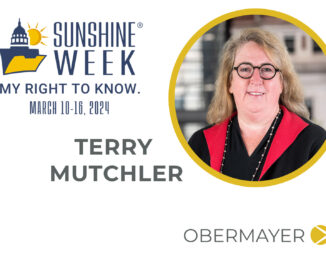When Firing An Employee Isn’t The Final Action of An Agency
The public will need to wait longer to obtain information about fired police officers and potentially other public employee terminations due to a recent Commonwealth Court ruling. As an exception to an exemption, the Pennsylvania Right-to-Know Law (“RTKL”) makes public employee termination records accessible when the employee’s discharge or demotion is the final action of the agency. Given the complexities of terminating public employees, it’s not clear when the final action of the agency occurs. This is the issue at the heart of In re Melamed, 2022 Pa. Commw. LEXIS 159 (Commw. Ct. Dec. 19, 2022). Melamed held police officer discharge records are not accessible until the conclusion of a mandatory grievance arbitration process rather than when the officer is initially terminated. This distinction is important because grievance arbitrations can take over a year to conclude. Requestors such as news agencies and prospective employers among others need the time-sensitive records much sooner. Waiting over a year for the records reduces the incentives to request records and undermines the RTKL’s goals of promoting government transparency and accountability.
“The final action of an agency” Explained
Section 708(b)(7)(viii) of the RTKL exempts discipline, demotion or discharge records contained in a public employee’s personnel file from disclosure. Although, records about “the final action of an agency that results in demotion or discharge” are publicly accessible. The RTKL does not define what “the final action of an agency” means. Meanwhile, courts and the Office of Open Records (“OOR”) have stepped in to interpret its meaning. Prior to Melamed, Silver v. Borough of Wilkinsburg, 58 A.3d 125, 130 (Pa. Cmwlth. 2012) held the final action of the agency is the termination of the employee. Conversely, OOR twice held where dismissals are subject to further review under a grievance arbitration process the final action of the agency is the completion of the arbitration process. Many public employees are covered by Collective Bargaining Agreements (“CBA”) and/or other statutes where their termination can be set aside through mandatory grievance arbitration or other administrative appeals processes.
The Case litigating RTKL requests for employee termination records.
Melamed began with Samantha Melamed and the Philadelphia Inquirer’s request to the Philadelphia Police Department (“PPD”) for records reflecting PPD officers dismissed in 2020. PPD contended it did not possess the list because the officers were subject to a mandatory grievance arbitration process that had yet to conclude. OOR agreed with PPD concluding no final actions resulting in demotion or discharge existed when the request was made. On appeal, the trial court agreed with OOR finding the records were not disclosable because police department discharges are governed by Policemen and Firemen Collective Bargaining Act or Act 111 (“Act 111”) where the grievance arbitrator’s decision is the final action. Melamed appealed seeking Commonwealth Court to conclude the final action of the agency occurs when a police officer is terminated.
Commonwealth Court Opinion
The Court in a 3-0 opinion written by Judge Covey affirmed the trial court’s order holding police officer dismissals pending review under Act 111 are not final actions subject to disclosure. Judge Covey first distinguished Silver, articulating it did not apply to police officers subject to Act 111’s grievance process, reasoning the RTKL does not apply when its provisions conflict with any other federal or state law. The Court articulated Act 111 allows police departments to collectively bargain and determined PPD officers bargained for the right to grieve their disciplinary actions and have an arbitrator review their dismissal. Judge Covey reasoned that because the arbitrator could reverse PPD’s termination decision the arbitrator’s decision was the final action of the agency. The Court found PPD was complying with Section 708(b)(7)(viii) because a prerequisite for disclosure had yet to occur because the mandatory arbitration process had yet to conclude. Judge Covey concluded the trial court’s conclusion was correct because mandatory arbitration was part of PPD’s employment termination process there could be no final agency action until the arbitrator’s decision.
Melmed’s Impact
Melmed’s immediate impact is requestors need to wait longer to access disciplinary records about employees covered by a CBA with a mandatory grievance arbitration provision. Additionally, requestors and their attorneys should not presume records about a public employee’s termination or demotion are disclosable whenever an agency terminates an employee. Instead, requestors or requestor’s counsel need to assess:
- whether the employee is covered by a CBA with a mandatory arbitration grievance provision;
- if the employee is covered by a CBA whether they appealed their dismissal;
- Whether the requested information would be useful after a lengthy wait if the employee is covered by mandatory grievance process and appealed their dismissal.
Longer term, Melmed’s reasoning could be applied in non-CBA contexts by governmental agencies and others to further temper the exception. For illustration, the Pennsylvania Civil Service Commission can hear appeals of non-CBA state employees and reverse agency decisions just like a mandatory grievance arbitrator.
Melmed demonstrates the nuances of making and litigating RTKL requests for employee termination records. If you are contemplating requesting or litigating public employee termination records or any other records Obermayer’s Transparency and Public Data practice group is here to help you navigate the RTKL’s nuances.
The information contained in this publication should not be construed as legal advice, is not a substitute for legal counsel, and should not be relied on as such. For legal advice or answers to specific questions, please contact one of our attorneys.





